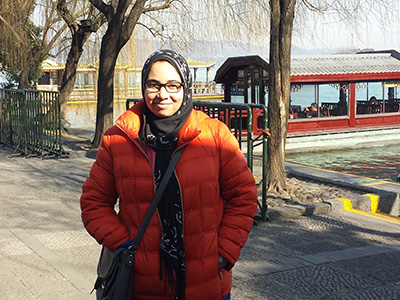
Of all the astonishing sights Mahaa Siddiqi saw during her three weeks in China as part of a January Term travel course, none remains as unforgettable as the visage of an 80-year-old man she met in Shanghai.
Siddiqi and her classmates had encountered the man at the Sunshine Rehabilitation Hospital, where he had come to have a new hearing device implanted. Though he was almost entirely deaf before coming to the hospital, with the help of the device the man found himself able to hear clearly.
“The look on his face when he could hear his wife’s voice again, it was amazing,” said Siddiqi, a junior biology major who plans to apply to medical schools. “It reminded me why I want to go into medicine. Technology is changing so fast and there are so many advances. It can make a real difference in people’s lives.”
Siddiqi enrolled in the January Term course, called Transcultural Views of Rehab Medicine, with the help of financial support from the Niebuhr Center. She was one of 15 Elmhurst students enrolled in the course, which is offered through the Upper Midwest Association for Intercultural Education (UMAIE), a consortium of colleges that pool resources to offer expanded opportunities to study abroad. The course examines the ways in which Western medicine and traditional Chinese medicine are practiced in hospitals, clinics and medical schools in China. The students visited clinical sites in Beijing, Shanghai and Hangzhou and met with physicians and practitioners there.
“The course description really caught my eye,” Saddiqi said. “It made me want to learn more about traditional Chinese medicine and see the way a different system works.”
Some of Saddiqi’s classmates got an up-close experience with traditional interventions like cupping, in which localized suction is used to mobilize blood flow and promote healing. Saddiqi said that a few students suffering from common colds volunteered to be treated with cupping therapy. They reported that their symptoms seemed to improve after the treatment.
Saddiqi said that she was most impressed with traditional Chinese medicine’s emphasis on preventing illness.
“What I learned on this trip helps me to appreciate our bodies as God’s creation that he entrusted to us. They have to be taken care of,” she said. “It really reinforced that this is what I want to do.”
The trip was a cultural education for Saddiqi, as well as a medical one. She tried her hand at bargaining with street merchants in Shanghai, felt like a celebrity as locals snapped photos of the visiting Americans at the Great Wall, and took her first ride on a subway in Beijing.
“It was all a big leap for me. I hadn’t really traveled on my own before,” she said. “Now I want to go back. There was something about the experience that made me feel really independent.”
She credited the Niebuhr Center with preparing her for her trip and for offering financial and organizational support.
Saddiqi’s advice for students considering travel abroad is clear.
“Go for it. It may reinforce the things you’re interested in, or you may find that you’re totally turned off,” she said. “Either way, you’ve learned something. You’re seeing who you are by getting outside your comfort zone.”